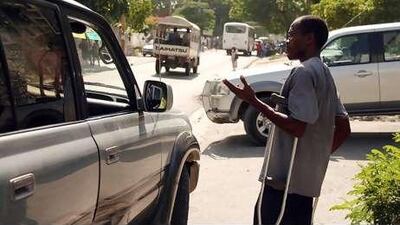PORT-AU-PRINCE // Sylvie Simerville, aged six, hobbles awkwardly around a prosthetics lab in the middle of Haiti's earthquake-ravaged capital, struggling to walk on the plastic and aluminium contraption doctors have just fitted to her amputated leg.
Despite jumping under a bed in her tutor's house when the earthquake struck on January 12, her leg was crushed by falling masonry. After she spent the night trapped under rubble, her mangled limb succumbed to a rapidly spreading infection. Silvie waited almost six months before doctors fitted her prosthetic limb. But she was lucky - many of the estimated 4,000 earthquake amputees still wait for even basic man-made limbs, because the healthcare system has been woefully overstretched by the 7.0-magnitude quake. Foreign aid groups have fitted some victims with clumpy man-made limbs costing about US$200 (Dh735) rather than the $40,000 spring-loaded contraptions typical in the nearby United States.
"It's God's work. God gave her the limb," says Silvia's mother, Violane Festil. "It's not how I would have wanted my daughter to live her life but there is nothing I can do about it. That's the way God planned it. My daughter is not so sad about it. She is just lucky that she is alive." Ms Festil recounts how her daughter was pulled from the rubble of her after-school tutor's home in the La Lue district of the capital, Port-au-Prince. "I told her to move her toes but she couldn't move them," she said. "It looked like her leg was all burnt."
Ms Festil describes five days of anguish ferrying her only daughter between clinics and hospitals until a doctor at the Centre Hospitalier du Sacré-Coeur said only amputation could prevent a gangrenous death. Their home destroyed, Ms Festil and her convalescing daughter shared a ramshackle tent with four others and waited for months for Handicap International to measure and fit her prosthetic limb as part of an aid project for 300 amputees.
"So far, she doesn't seem to be so worried about it," says Ms Festil. "The only thing is that she has asked me whether her leg will ever grow back." Pascal Kodjo, 50, the orthopaedic doctor who runs the clinic with a 30-strong team, says fitting limbs is a time-consuming job involving assembling the prosthetics, moulding them comfortably around stumps and teaching amputees to walk again. "The people are coming - more, more, more," he said. "But our waiting list is full."
Prosthetics experts such as Dianne Jean-Francois, the country director for the Catholic Medical Mission Board and herself an amputee, say the Haitian healthcare system was woefully ill-equipped even before the earthquake reduced more than 50 hospitals and clinics to rubble, including two of Port-au-Prince's prosthetics units. Haiti's "action plan for national recovery", which secured pledges worth US$5.3 billion for the first two-year reconstruction phase from foreign donors in March, envisioned the creation of a comprehensive healthcare system as part of a wholesale national revamp.
"That is why we are working with the Ministry of Health - this is the opportunity to have one sole leader so that sometime in the future, in 2020, the people in need are able to get quality healthcare - this is the goal," said Ms Jean-Francois. But for Bernard Nau, a prosthetics expert for Helping Hands for Haiti, such aspirations are very ambitious, with the Caribbean nation having fewer than 100 prosthetics and rehabilitation clinicians before the earthquake and requiring many times more now to cater for the current number of amputees.
For Pierre Louis Luckner, Haiti's healthcare plans are moving far too slowly. His leg was crushed under a collapsing wall on the streets of the Delmas district when the earthquake struck, prompting a live-saving amputation three days later. By day, the 36-year-old former builder and father of two supports himself on crutches while begging from passing motorists on the road to Petionville. By night, he spends sleepless hours on a muddy patch in a friend's tent, hoping that he will reach the top of his waiting list for a prosthetic limb.
"It has been more than two months since I have sent any money to provide for my children, so I'm still looking for some kind of work," he said, while begging for cash to send to his daughters, who are staying with friends on Haiti's western tip. "I've been standing here all morning, and all I've managed to get is 15 gourds [Dh1.40]." @Email:jreinl@thenational.ae
Read Return to Haiti part 1 here. Watch and hear our audio-visual report on Haiti six months after the earthquake here.


